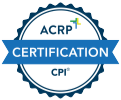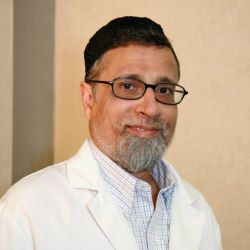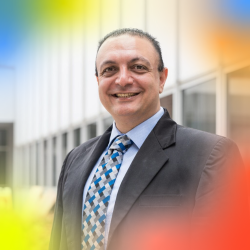It’s no secret that the clinical research enterprise faces many struggles related to attracting and retaining qualified physicians to serve as principal investigators (PIs) for clinical trials. All too often, the first trial a PI completes is also their last one. However, when someone with a passion for research takes on the PI mantle as a true calling, it becomes part of their professional and personal identities.
Providing us with insights on how they became PIs and what kinds of challenges they have faced in the role are four holders of the Certified Principal Investigator (CPI®) designation through the Association of Clinical Research Professionals: Radwa Aly, PhD, MSc, CPI, Chief and Executive Director, Clinical Research Administration and Operations, with the GW Medical Faculty Associates at George Washington University School of Medicine and Health Sciences in Washinton, D.C.; LaShonda Crane, DNP, APRN, FNP-C, CPI, CCRC, a Research Clinician/Principal Investigator based in Texas; Jeffrey Hirschfield, MD, CPI, DipABP, DipABLM, a self-employed pediatrician, Assistant Professor at the University of South Florida, Chief Creative Officer and Director of Medical Affairs at Midnight Medicine Inc., and President/CEO/Medical Director of the Score Physician Alliance; and Muhammad Waseem, MBBS, MS, FAAP, FACEP, FAHA, FSSH, CPI, a Professor at Weill Cornell Medicine and an Attending Physician and Research Director for Emergency Medicine at Lincoln Medical & Mental Health Center in New York, where he is also Vice Chair of the Institutional Review Board.
ACRP: What inspired you to become a PI and what were you doing before that?
 Aly: I always knew I wanted to be involved in healthcare and helping people since my college days, but there was always something telling me medical school wasn’t just it for me. A mentor of mine proposed to me that I explore clinical research, and I was very intrigued as I had never heard about it before. I started off as a clinical research assistant and immediately knew I had found my calling. I started exploring the career trajectory I could follow in the field. That, coupled with my own curiosity and desire to ask questions and answer them, led me down the path of becoming a PI. There is not a day that I have looked back and thought I should be doing something else.
Aly: I always knew I wanted to be involved in healthcare and helping people since my college days, but there was always something telling me medical school wasn’t just it for me. A mentor of mine proposed to me that I explore clinical research, and I was very intrigued as I had never heard about it before. I started off as a clinical research assistant and immediately knew I had found my calling. I started exploring the career trajectory I could follow in the field. That, coupled with my own curiosity and desire to ask questions and answer them, led me down the path of becoming a PI. There is not a day that I have looked back and thought I should be doing something else.
 Crane: I am one of those people who ended up in research unintentionally. I had a newborn and no insurance, so I answered an ad to participate in a clinical trial for a new antidepressant. The medication didn’t work for me, but I loved every other aspect of working in clinical trials. I asked a lot of questions, and by the time my 16-week study participation was over, I was offered a job. I started at the front desk, moved to finance, and became a regulatory document specialist. When the doctor I was working with got ready to retire, to keep doing what I loved, I needed a nursing license. The week I graduated nursing school, a former coworker called and said her coordinator had just put in her notice, and would I please come work with her? My child is now 32, and that nursing license has been joined by a Doctor of Nursing Practice (DNP) degree.
Crane: I am one of those people who ended up in research unintentionally. I had a newborn and no insurance, so I answered an ad to participate in a clinical trial for a new antidepressant. The medication didn’t work for me, but I loved every other aspect of working in clinical trials. I asked a lot of questions, and by the time my 16-week study participation was over, I was offered a job. I started at the front desk, moved to finance, and became a regulatory document specialist. When the doctor I was working with got ready to retire, to keep doing what I loved, I needed a nursing license. The week I graduated nursing school, a former coworker called and said her coordinator had just put in her notice, and would I please come work with her? My child is now 32, and that nursing license has been joined by a Doctor of Nursing Practice (DNP) degree.

Hirschfield: My early introduction into research began as a Neuroscience major at the University of Florida with a focus on spinal cord injury and paralysis. After completing my pediatric residency, I began PI consulting during my first pediatrician job in private practice. My experiences supported a successful career in dual roles as pediatrician and as a CPI in both adult and pediatric indications. Our trials spanned consumer-based healthcare product testing, nutraceuticals, and pharmaceuticals for more than 25 years.
 Waseem: My journey to becoming a PI was shaped by my early career as an emergency physician—a role that fueled my curiosity to understand the mechanisms behind each treatment. This curiosity, I believe, was a significant factor in my development, fostering a strong foundation in critical thinking and problem-solving. This passion for discovery continues to guide me on my journey as a PI. The thrill of uncovering new insights and contributing to collective knowledge is a significant source of joy in my work. This excitement of discovery is contagious—it keeps me going, and I hope it ignites a similar enthusiasm in those considering a research career. As a PI, I play a direct role in shaping our understanding of the field, and my background as an emergency physician feeds my desire to make a tangible impact on healthcare outcomes.
Waseem: My journey to becoming a PI was shaped by my early career as an emergency physician—a role that fueled my curiosity to understand the mechanisms behind each treatment. This curiosity, I believe, was a significant factor in my development, fostering a strong foundation in critical thinking and problem-solving. This passion for discovery continues to guide me on my journey as a PI. The thrill of uncovering new insights and contributing to collective knowledge is a significant source of joy in my work. This excitement of discovery is contagious—it keeps me going, and I hope it ignites a similar enthusiasm in those considering a research career. As a PI, I play a direct role in shaping our understanding of the field, and my background as an emergency physician feeds my desire to make a tangible impact on healthcare outcomes.
ACRP: What has been the biggest challenge/change in clinical research during your experience as a PI and how did you handle it?
Aly: Juggling the evolving landscape towards decentralized trials and use of electronic platforms for research has taken a lot of effort. I think there is a song and dance here—we’re trying to provide access to individuals that otherwise wouldn’t have access, but without adding undue burden from the devices and technology being used in order to access the trials. It has been a fun challenge, but a challenge nonetheless.
Crane: The drive for knowledge never really stops, just as the drive for helping others doesn’t change. I have had the great fortune to be able to work with not one, but two groundbreaking providers that pushed me outside my comfort zone, and who let me falter around a bit until I found my way. I don’t think many get that opportunity. I learned over the years that if I didn’t understand something, I should ask. If I asked, I always got an answer, and sometimes a better explanation, as well.
Hirschfield: Probably the largest challenges in outpatient conduct of research have been from mergers and acquisitions and the COVID-19 pandemic. Both adversely impacted sponsor/monitor study management, financials, and site-level personnel to adequately support site efficiency. We also experienced research incentive losses, making it unrealistic, in some cases, to accept some outpatient trials. My mindset is to “do less better.” Nevertheless, research businesses can flourish on longstanding business relationships, attention to detail, and the delivery of high-quality outcomes.
Waseem: The role of a PI is challenging and requires a diverse skillset and team leadership. As a PI, I’ve come to understand that this role is not a solitary one. The support and collaboration of my teams have been instrumental in overcoming significant hurdles in clinical research. I’ve been fortunate to have teams that have stood by me through our challenges. While obstacles may arise, it’s crucial to maintain enthusiasm and resilience. Empowering your team and building trust is critical. The energy of a unified team is infectious. Research is a journey with its share of ups and downs. The ability to persevere through these barriers and learn from failures is vital to success. The value of each team member’s contribution cannot be overstated, and this collaborative spirit makes our research endeavors successful.
It has also been a complex challenge to handle the dual responsibilities of providing patient care and enrolling them in research. Ensuring that patients receive the highest standard of care while also meeting the demands of enrolling them in research studies is a delicate balancing act. This challenge is particularly pronounced when dealing with vulnerable populations, limited resources, and tight timelines. Adhering to ethical guidelines ensures that patient rights are protected and research is conducted responsibly. By prioritizing patient care and maintaining transparent communication, trust is built, leading to better patient cooperation and engagement in research. Balancing patient care with research enrollment requires careful planning, clear communication, and a patient-centric approach. This ensures that research procedures do not compromise patient care. I allow participants to enter the research voluntarily and with adequate information without coercion and undue influence. I also clearly explain the research’s purpose, procedures, and potential benefits and risks, ensuring the patient feels informed and comfortable, thereby protecting their rights and well-being.
The most crucial aspect of all research endeavors is maintaining integrity and honesty. This is the foundation of ethical conduct in clinical research. Staying updated with regulatory requirements and evolving ethical standards is crucial. The time it took to become a successful PI will not matter in a few years. What will matter is that you conducted your research with the highest ethical standards and integrity.
Resources
Who Are the Active U.S. Principal Investigators?
A Competency-Based Approach to Principal Investigator Responsibilities(TM)
ACRP Functional Competency Guidelines for Principal and Sub-Investigators(TM)
Edited by Gary Cramer



